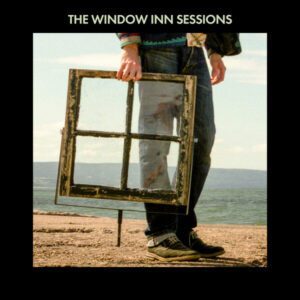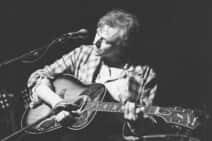Back in Toronto to help celebrate The Horseshoe Tavern’s sixty-fifth anniversary, Canadian music vet Joel Plaskett wrapped up the year with a five night concert series honouring the legendary bar.
And what a year it’s been for the Nova Scotia native and his band, The Emergency. Having individually recorded and released one song per week for their latest album, Scrappy Happiness, they also completed a cross-country tour accompanied by English folk musician, Frank Turner.
While bracing to head off into a new year, Plaskett set aside a few minutes to reflect on his creative process, east coast living, and keeping up with the shifting place of music in the twenty-first century.
Sticky: Being a tour veteran, do cities like Toronto now feel like homes-away-from-home?
Joel: Well it’s certainly really comfortable, yeah. I know more people in this city than I do in any other city outside of Halifax, so when I come to Toronto I have lots of old friends that I can call that are here. So, I definitely feel familiar. I’ve never had an inkling to live here, but I’ve always enjoyed coming and it’s really an easy place for me to make my way about, and know who to call and where to eat and all those things. And The ‘Shoe is such a familiar and comfortable venue, so I’ve really been looking forward to this for awhile.
Sticky: Other east coast musicians talk about how living in the Maritimes keeps them humble. What is it about Halifax that makes it “humble” in comparison to other cities?
Joel: I don’t know if humble’s… you know, I think people take a lot of pride in what they do, and I’d be lying if I said I didn’t have some sort of ego about what I do. I think you need to have a bit of an ego to take the stage, you know what I mean? But at the same time, the one thing about Halifax – the size of the town – is that if you get too big for your britches it doesn’t really serve you well. I don’t think it serves you well anywhere, frankly, but you really find out if it isn’t working in Halifax; It’s a good gauge. In a place like Toronto, if you have a lot of money, or if you choose to walk in a certain circle where you can get your ego stroked, you can probably go find it because there’s so many people and there’s a lot of people who want to “celebrate”. There’s a degree of celebrity in Toronto. But Halifax has a much smaller degree of celebrity. That’s not to say that you still can’t get carried away with yourself if you choose to, but it’s a little bit harder to find a large community who will accept that for any duration. So, I think that’s sort of what it is. And frankly, for me the idea of playing music has never been about fame. I like it as a livelihood. I like it because I enjoy the entertainment and I like music and playing and I like communication. The idea of fame is a total fucking prison as far as I’m concerned. Anything I can do to demystify it… maybe that’s what comes across as humble. But for me, it’s actually about trying to remain a human being in my hometown.
Sticky: That sounds like a really healthy attitude to keep. With your latest album, you recorded one song per week and then directly released them to the CBC and iTunes. Was that more stressful than recording in a more traditional method?
Joel: Yeah, only because it was more fatiguing. There was that deadline every Thursday to make the iTunes release on Tuesday, so I had to let go of things, but I also had to keep my focus for ten weeks. It felt like I was delivering papers in university for like ten weeks, you know? It’s a long time to retain focus. And I would try to take the weekends kind of off while I was doing it, just so I could still have some family time and stuff, but it was challenging because even when I wasn’t in the studio I was thinking “Shit, when I get back there I gotta get to work, I got this deadline to make.” It was a fun experiment, I really liked the energy it brought to the record, but I wouldn’t do it exactly the same way again for sure.
Sticky: Was there ever a concern with the songs not being cohesive on the album?
Joel: I tried to pick songs that I thought would have connections to each other, but I know this record probably has a little bit more variety in terms of stylistic things or whatever. But then I also kind of felt like the fact that it was all happening in one period of time, and the mission statement behind the record in terms of the approach and the subject matter I felt connected the dots. It’s for somebody else to tell me if it was consistent or inconsistent. I think the way people received the record, in terms of a song a week if they were following, maybe led to a different analysis of it when you hear it sequenced at the end. It was slightly more challenging to sequence because it was done almost as a series of singles. Having said that, I’m happy with it. There’s stuff I’d change about it, but there’s stuff I’d change about all my records.
Sticky: While you were recording, you did a podcast each week, documenting your process. Was it strange to see yourself retrospectively, and did your self-image change after watching yourself?
Joel: Well, I knew that was part of what I had set out to do and what I had to do as far as delivering the record. It was a little bit of “God, I’m tired of myself!” You start feeling you’re reacting to yourself on a weekly basis, you know? Like, “I gotta do something different! This one’s gonna be funny, and now I gotta be serious or else people are just gonna think I’m a goof!” But, at the same time, if you go down that wormhole you can never come out either. So I tried not to get too hung up on it. I just was like “Let this be in the moment, let the record be in the moment, let the blogging be in the moment.” I’m a pretty light-hearted person when I’m working; I’m often sort of goofier when I’m working than when I’m in other situations. There was still some frustration involved in recording and stuff – points where I thought “Oh my God”. For me, I certainly want to hear good music from other people, but I also like to get a sense of personality and it’s something that to me is really… there’s a lack of. Even in celebrities, it’s either all personality with no substance, a lot of talk and no action, or all serious and you never get a sense of what the people behind it are. For me, it’s always been a balancing act of trying to unveil a bit of the things I care about and if they’re peculiar or funny or weird, so be it – at least it gives people a sense of what it is I’m doing. And, you know, I just enjoy making stuff. That’s part of it.
Sticky: You also ran a video contest online where fans sent in self-made videos, and were really able to interact with you. As a musician, do you feel that the internet has been more of a help than a hindrance to the music industry?
Joel: I don’t know, it just is what it is, I think. There was a time when recordings started being made, I guess in the ’20s and ’30s as recording technology developed, and I’ve read stuff about jazz musicians from New Orleans who were in high demand as players. All these musicians that didn’t want to be recorded because it was like “Oh yeah, then somebody’s just gonna steal my chops and I’m gonna stop getting gigs”. And then there was a whole other slew of musicians who were like “Yeah man, I’ll take any gig you can give me. Record me.” And then there’d be people who’d end up on records and then there was probably a ton of really talented people who never did. You kind of have to morph with what the public is interested in. If the public is interested in the internet, then you become a part of it or… You can be a luddite if you want – if you’re making such amazing music that the people who care are gonna come to it and there’s enough of an underground that you retain your mystery and still have a fan base. But it’s hard to do, you know? The internet’s a huge part of it now, it’s where so many people spend their time. I don’t know that it is a good thing as far as an oratory experience. Records sound great, vinyl sounds great. Recordings made in nice studios, which are dying on the vine, sound better. Mp3s don’t… they don’t sound great – everything’s crunchy. In terms of something like music that’s about your ears, I don’t know that the internet brings a lot to it other than to create a sense of interest and celebrity and video and a visual connection to music. But for me, music is still about your ears. I think there is a disconnect there, and I think that’s where some of the frustration musicians have comes from. But it’s not exclusive, and some people really run with it. Feist makes amazing music videos… there’s people that make them on her behalf and it becomes a totally other experience. And you see that starting to go into shows – you see these big audio-visual experiences behind people while they’re playing. And then you see footage of Led Zeppelin from 1972, and they get up there on a stage in the blazing hot sun, and there’s not a big light show, and even the PA is probably small by today’s standards, and they just kick out the jams and everybody freaks out and gets high or whatever. But now it’s about going and watching people with headset mics prance around in front of giant screens that are showing waterfalls. And you know what? The young generation thinks it’s fucking awesome. I think a lot of younger people really love the multimedia aspect of it. For me, it’s still about words and melody and what you present on a sonic level. But I’ll embrace the internet and run with it ’cause I want to swim.
Sticky: Speaking of words, you’re a very communicative person and a strong lyricist. Are you of the vein of thought that good lyricists are born or learned?
Joel: I think you have to have a knack. You can develop that knack, but where the real personality comes from, I don’t know. I don’t know if I was born or learned. I think what I do is of some value, and it feels right to me when I sing it. I enjoy it, people seem to respond to it. I have an audience, so it doesn’t suck. I don’t know if it’s everybody’s cup of tea, but there must be something I’m doing right for some people. With art it’s a really weird thing because things just pop into my head. I don’t know if that comes from having listened to a lot of music. I listen to the sound of something and the way things roll off people’s tongues, phrases you hear people say on a record or in a bar or in conversation, and that sometimes makes it way into a song. So I’m always making notes in my mind. But sometimes out of nowhere, with all that stuff that I think about as I’m making notes, a bunch of words show up and I don’t know where it comes from. So, I don’t know. The brain is still a mysterious thing. If you’re searching for something, I don’t know what crevice of your brain you have to reach in to get it.
Sticky: One last thing: Earlier this year you toured with Frank Turner, who describes himself on twitter as a “Skinny, half-arsed English country singer”. Can you verify this statement or dismiss it?
Joel: Well, he’s skinny. Not as skinny as me, so you know. He’s in considerably better shape than me. The music’s not really country, and he’s not really half-arsed either because he’s great. So, I don’t know. It actually all seems incorrect. Oh no, the skinny part is all relative, so yeah, and I guess country’s relative too, so yeah. Frank’s more country than a lot of country music, so sure. I’ll buy it, or I won’t. But he’s fantastic. Frank, frankly, he lit a fire under my ass ’cause he’s such a good performer. He’s not an easy act to follow.





